Why the Black Sea called "black sea"?
All have long been accustomed, and no one comes to mind is that our Black Sea might otherwise be called. However, this is such a familiar, warm, and has not even scary, his name was the sea is not always the case. Rather, it had been, but very, very long time.
And really, why the Black Sea called "black"?
From the most ancient Iranian texts reveal that the sea was called "ahshayna," which means "dark, opaque, black." And then the name has been forgotten for several hundred years. To reappear? So this is just what was the name of the most accurate and correct, time after time for him also, and returned (the first word is more expensive than the second?).
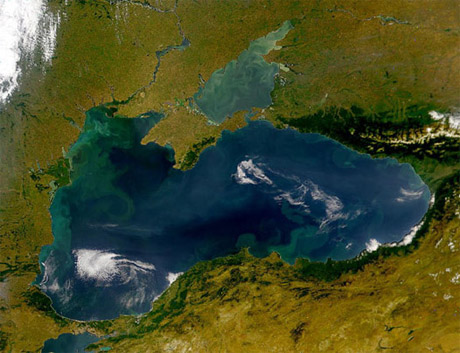
Nevertheless, from the time when the historical and geographical documents we find the first mention of the Black Sea and up to now, accumulated a few dozen names of the basin. The great Greek colonization of this region in their written sources from the IX-VIII centuries. BC mentioned is the sea more than once. At first, the newcomers from the south sea met, apparently inhospitable. It was struck by their strong winter storms and ice near the northern coast. In addition, local residents - Brand - Deals damage to sensitive Greek sailors. This is probably why the Black Sea for a long time was called by the Greeks inhospitable sea.
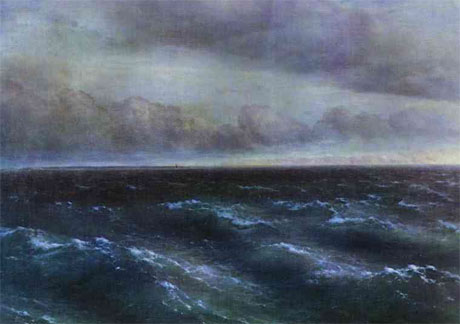
Over the years, with further penetration into the northern Black Sea region and settlement of its fertile shores, the Greeks began to call the sea hospitable (Evksinos Pontos). This name was recorded in the sea of Herodotus (Vv. BC), as well as on the map of Ptolemy (AD IIv.) Descriptions of Pontus Euxine we find in the sailing directions of the time - Periplus (marine guide).
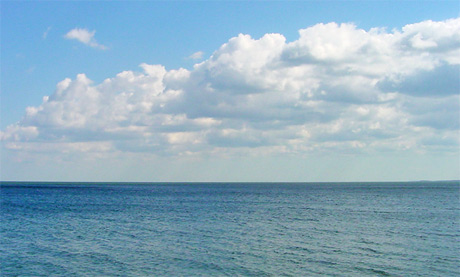
Late Arab geographers, using scientific knowledge about the Black Sea, ancient scholars, greatly complement and enhance them with new information acquired as a result of strengthening trade ties with Middle Eastern Black Sea Region (Here lies the most famous trade routes: from the Vikings to the Greeks "and" The Great Silk Road . Judging from historical documents, the Black Sea was called then Russian. It was noted in the Arab scholars Masoudi (mid-XB). Edrizi and (XIIv.). This is not surprising, since the first documented use of the word "growing", "Rus" are connected namely the Crimea (Tavrica). Some Russes lived on the peninsula in IXv. and later. At the same time educator Cyril saw Tavrika book, "Russian written to write." But who was hiding under this name: the Scythians, or Slavs - to answer accurately can not nobody. The Greeks, for example, XB. Scythians were called Rus, and even brand-Scythians, Arabs are also specifically called Rus Slavs. It is obvious only that the Indo-Aryan reading the word "grown" means "bright white". It follows, as Paradoxically, the Black Sea at one time was called the "White" Sea - Russian? "and named it for several hundred years. At some Italian cards (portolanah) is the name persisted until the XV-XVIvv. But along with that name in some cultures and travel The Black Sea was called in its own way.
Since the famous traveler Marco Polo (XIIIv.) called the Black Sea in his great "book" Great Sea. Oriental authors at the same time often mentioned the Black Sea, under the name of Sudak (Surozh), thereby emphasizing the wide popularity of the Crimean mall Sudak (Sourozh). Outstanding is the domestic traveler Athanasius Nikitin, who was in the Crimea in XV century., Returning from his big trip, "the three seas to India, called the Black Sea (the third on its way) - Istanbul. There were other names: Cimmerian, Tauride, Crimean, Slavic, Greek, Georgian, and even Armenian. Why, for example, the Armenian? We can assume that when XIv. in the Crimea moved a large number of Armenians who ousted the Persians, and Seljuk Turks from their traditional territories and part of east Crimea current Belogorsk becomes Seaside Armenia - a significant economic and religious center, the sea, also known as Armenian.
In the ongoing struggle for dominance over the Black Sea next inscription on the map disappears along with the displacement of the next "owner" of the Black Sea.
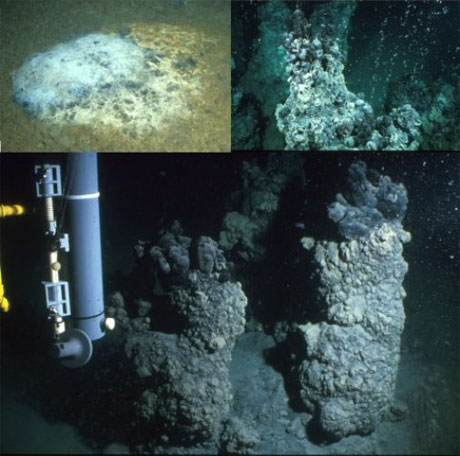
Photo: GHOSTDABS - Hamburg University
Present the same name, returning, as we have said, for the Black Sea is held for several centuries. At the same semantic meaning in different languages remains the same. Black Sea, for example, the Turks called Karadeniz on neo-Greek - Mauritius-Thalassa ", German" Shvartses Meer ", etc. Our sea called the black for a darker shade of its deep waters. This feature of the basin can be clearly seen in the transition from the Mediterranean to the Black Sea.
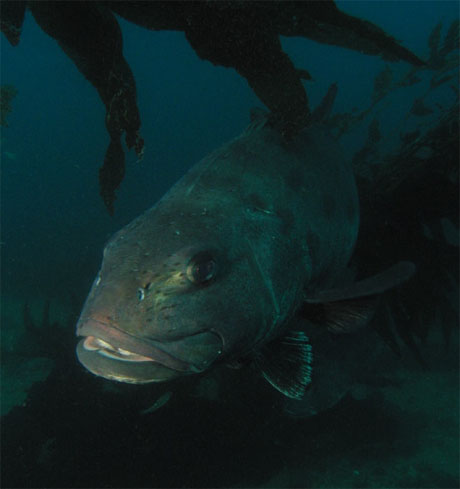
And really, why the Black Sea called "black"?
From the most ancient Iranian texts reveal that the sea was called "ahshayna," which means "dark, opaque, black." And then the name has been forgotten for several hundred years. To reappear? So this is just what was the name of the most accurate and correct, time after time for him also, and returned (the first word is more expensive than the second?).

Nevertheless, from the time when the historical and geographical documents we find the first mention of the Black Sea and up to now, accumulated a few dozen names of the basin. The great Greek colonization of this region in their written sources from the IX-VIII centuries. BC mentioned is the sea more than once. At first, the newcomers from the south sea met, apparently inhospitable. It was struck by their strong winter storms and ice near the northern coast. In addition, local residents - Brand - Deals damage to sensitive Greek sailors. This is probably why the Black Sea for a long time was called by the Greeks inhospitable sea.
Over the years, with further penetration into the northern Black Sea region and settlement of its fertile shores, the Greeks began to call the sea hospitable (Evksinos Pontos). This name was recorded in the sea of Herodotus (Vv. BC), as well as on the map of Ptolemy (AD IIv.) Descriptions of Pontus Euxine we find in the sailing directions of the time - Periplus (marine guide).

Late Arab geographers, using scientific knowledge about the Black Sea, ancient scholars, greatly complement and enhance them with new information acquired as a result of strengthening trade ties with Middle Eastern Black Sea Region (Here lies the most famous trade routes: from the Vikings to the Greeks "and" The Great Silk Road . Judging from historical documents, the Black Sea was called then Russian. It was noted in the Arab scholars Masoudi (mid-XB). Edrizi and (XIIv.). This is not surprising, since the first documented use of the word "growing", "Rus" are connected namely the Crimea (Tavrica). Some Russes lived on the peninsula in IXv. and later. At the same time educator Cyril saw Tavrika book, "Russian written to write." But who was hiding under this name: the Scythians, or Slavs - to answer accurately can not nobody. The Greeks, for example, XB. Scythians were called Rus, and even brand-Scythians, Arabs are also specifically called Rus Slavs. It is obvious only that the Indo-Aryan reading the word "grown" means "bright white". It follows, as Paradoxically, the Black Sea at one time was called the "White" Sea - Russian? "and named it for several hundred years. At some Italian cards (portolanah) is the name persisted until the XV-XVIvv. But along with that name in some cultures and travel The Black Sea was called in its own way.
Since the famous traveler Marco Polo (XIIIv.) called the Black Sea in his great "book" Great Sea. Oriental authors at the same time often mentioned the Black Sea, under the name of Sudak (Surozh), thereby emphasizing the wide popularity of the Crimean mall Sudak (Sourozh). Outstanding is the domestic traveler Athanasius Nikitin, who was in the Crimea in XV century., Returning from his big trip, "the three seas to India, called the Black Sea (the third on its way) - Istanbul. There were other names: Cimmerian, Tauride, Crimean, Slavic, Greek, Georgian, and even Armenian. Why, for example, the Armenian? We can assume that when XIv. in the Crimea moved a large number of Armenians who ousted the Persians, and Seljuk Turks from their traditional territories and part of east Crimea current Belogorsk becomes Seaside Armenia - a significant economic and religious center, the sea, also known as Armenian.
In the ongoing struggle for dominance over the Black Sea next inscription on the map disappears along with the displacement of the next "owner" of the Black Sea.

Photo: GHOSTDABS - Hamburg University
Present the same name, returning, as we have said, for the Black Sea is held for several centuries. At the same semantic meaning in different languages remains the same. Black Sea, for example, the Turks called Karadeniz on neo-Greek - Mauritius-Thalassa ", German" Shvartses Meer ", etc. Our sea called the black for a darker shade of its deep waters. This feature of the basin can be clearly seen in the transition from the Mediterranean to the Black Sea.






 Mohanraj
Mohanraj

 Posted in:
Posted in: 





0 comments:
Post a Comment